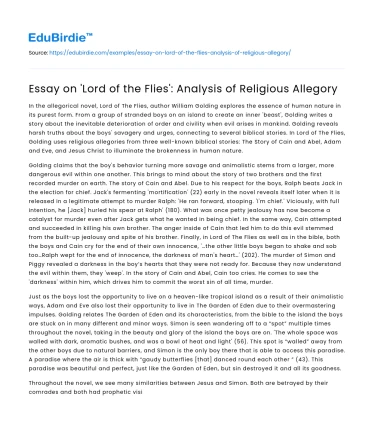In the allegorical novel, Lord of The Flies, author William Golding explores the essence of human nature in its purest form. From a group of stranded boys on an island to create an inner 'beast', Golding writes a story about the inevitable deterioration of order and civility when evil arises in mankind. Golding reveals harsh truths about the boys' savagery and urges, connecting to several biblical stories. In Lord of The Flies, Golding uses religious allegories from three well-known biblical stories: The Story of Cain and Abel, Adam and Eve, and Jesus Christ to illuminate the brokenness in human nature.
Golding claims that the boy's behavior turning more savage and animalistic stems from a larger, more dangerous evil within one another. This brings to mind about the story of two brothers and the first recorded murder on earth. The story of Cain and Abel. Due to his respect for the boys, Ralph beats Jack in the election for chief. Jack's fermenting 'mortification' (22) early in the novel reveals itself later when it is released in a legitimate attempt to murder Ralph: 'He ran forward, stooping. 'I'm chief.' Viciously, with full intention, he [Jack] hurled his spear at Ralph' (180). What was once petty jealousy has now become a catalyst for murder even after Jack gets what he wanted in being chief. In the same way, Cain attempted and succeeded in killing his own brother. The anger inside of Cain that led him to do this evil stemmed from the built-up jealousy and spite of his brother. Finally, in Lord of The Flies as well as in the bible, both the boys and Cain cry for the end of their own innocence, '…the other little boys began to shake and sob too…Ralph wept for the end of innocence, the darkness of man's heart…' (202). The murder of Simon and Piggy revealed a darkness in the boy’s hearts that they were not ready for. Because they now understand the evil within them, they 'weep'. In the story of Cain and Abel, Cain too cries. He comes to see the 'darkness' within him, which drives him to commit the worst sin of all time, murder.
Save your time!
We can take care of your essay
- Proper editing and formatting
- Free revision, title page, and bibliography
- Flexible prices and money-back guarantee
Just as the boys lost the opportunity to live on a heaven-like tropical island as a result of their animalistic ways, Adam and Eve also lost their opportunity to live in The Garden of Eden due to their overmastering impulses. Golding relates The Garden of Eden and its characteristics, from the bible to the island the boys are stuck on in many different and minor ways. Simon is seen wandering off to a “spot” multiple times throughout the novel, taking in the beauty and glory of the island the boys are on. 'The whole space was walled with dark, aromatic bushes, and was a bowl of heat and light' (56). This spot is “walled” away from the other boys due to natural barriers, and Simon is the only boy there that is able to access this paradise. A paradise where the air is thick with “gaudy butterflies [that] danced round each other ” (43). This paradise was beautiful and perfect, just like the Garden of Eden, but sin destroyed it and all its goodness.
Throughout the novel, we see many similarities between Jesus and Simon. Both are betrayed by their comrades and both had prophetic visions. A couple of nights before his death, Simon talks to Ralph in a situation similar to Jesus during the “Last Supper': 'I just think you'll get back all right'…and then they suddenly smiled at each other (111). Simon reassures Ralph of his safety while never addressing his own, suggesting his sense that his end was near. This prophetic vision mirrors Jesus and his otherworldly abilities. Secondly, Jesus set out to spread the gospel or truth and was crucified because of it. Simon endeavors to also share the truth about the “beast” and its connection to boys and is murdered just like Jesus. Furthermore, before Jesus’ death, he is ordered to carry the cross to Calvary. A pretty lengthy journey. Stumbling and exhausted, Jesus asks for help carrying the cross upon his death. Similar to Jesus, Simon stumbles on the floor and can barely speak due to the exhaustion of his long journey across the island. Unfortunately, due to his unusual behavior, he is mistaken for a beast and killed. Right before Jesus’ death, he cried out to God in Luke 23:24 saying, “Father, forgive them, for they do not know what they are doing.” Simon also suffered a gruesome death due to the boy's false belief that he was a beast. For the boys did not know what they were doing.
By using religious allegory and biblical parallels, William Golding was able to redefine his novel, adding a much deeper dimension to what on the surface, seemed like just an adventure story. The Bible is viewed by many as the moral compass of guidance and judgment. By interlocking parts of his novel with stories and teachings from the bible, he was able to compare the boys and their mannerisms against the ethical standards the bible teaches. Since the boy's behaviors equated to the some of worst and lowest instances of morality when compared to the bible, Golding’s claim is confirmed: man is inherently evil.






 Stuck on your essay?
Stuck on your essay?

